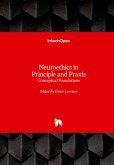James Giordano / Bert Gordijn (ed.)
Scientific and Philosophical Perspectives in Neuroethics
Herausgeber: Giordano, James J.; Gordijn, Bert
James Giordano / Bert Gordijn (ed.)
Scientific and Philosophical Perspectives in Neuroethics
Herausgeber: Giordano, James J.; Gordijn, Bert
- Gebundenes Buch
- Merkliste
- Auf die Merkliste
- Bewerten Bewerten
- Teilen
- Produkt teilen
- Produkterinnerung
- Produkterinnerung
An interdisciplinary exploration of important developments in neuroscience, and the philosophical, ethical, and social issues that such advancements generate.
Andere Kunden interessierten sich auch für
![Philosophical Reflections on Medical Ethics Philosophical Reflections on Medical Ethics]() Philosophical Reflections on Medical Ethics37,99 €
Philosophical Reflections on Medical Ethics37,99 €![Scientific Characters: Rhetoric, Politics, and Trust in Breast Cancer Research Scientific Characters: Rhetoric, Politics, and Trust in Breast Cancer Research]() Lisa KeränenScientific Characters: Rhetoric, Politics, and Trust in Breast Cancer Research52,99 €
Lisa KeränenScientific Characters: Rhetoric, Politics, and Trust in Breast Cancer Research52,99 €![Neuroethics in Practice Neuroethics in Practice]() Neuroethics in Practice125,99 €
Neuroethics in Practice125,99 €![Philosophical Reflections on Medical Ethics Philosophical Reflections on Medical Ethics]() Nafsika AthanassoulisPhilosophical Reflections on Medical Ethics62,99 €
Nafsika AthanassoulisPhilosophical Reflections on Medical Ethics62,99 €![Neuroethics Neuroethics]() Neil LevyNeuroethics103,99 €
Neil LevyNeuroethics103,99 €![Neuroethics in Principle and Praxis Neuroethics in Principle and Praxis]() Neuroethics in Principle and Praxis91,99 €
Neuroethics in Principle and Praxis91,99 €![A New Theory of Vision and Other Select Philosophical Writings A New Theory of Vision and Other Select Philosophical Writings]() George BerkeleyA New Theory of Vision and Other Select Philosophical Writings39,99 €
George BerkeleyA New Theory of Vision and Other Select Philosophical Writings39,99 €-
-
-
An interdisciplinary exploration of important developments in neuroscience, and the philosophical, ethical, and social issues that such advancements generate.
Hinweis: Dieser Artikel kann nur an eine deutsche Lieferadresse ausgeliefert werden.
Hinweis: Dieser Artikel kann nur an eine deutsche Lieferadresse ausgeliefert werden.
Produktdetails
- Produktdetails
- Verlag: Cambridge University Press
- Seitenzahl: 420
- Erscheinungstermin: 18. Februar 2010
- Englisch
- Abmessung: 235mm x 157mm x 27mm
- Gewicht: 756g
- ISBN-13: 9780521878555
- ISBN-10: 0521878551
- Artikelnr.: 26551278
- Herstellerkennzeichnung
- Libri GmbH
- Europaallee 1
- 36244 Bad Hersfeld
- gpsr@libri.de
- Verlag: Cambridge University Press
- Seitenzahl: 420
- Erscheinungstermin: 18. Februar 2010
- Englisch
- Abmessung: 235mm x 157mm x 27mm
- Gewicht: 756g
- ISBN-13: 9780521878555
- ISBN-10: 0521878551
- Artikelnr.: 26551278
- Herstellerkennzeichnung
- Libri GmbH
- Europaallee 1
- 36244 Bad Hersfeld
- gpsr@libri.de
Foreword Neil Levy; Introduction James J. Giordano; 1. Developments in
neuroscience: where have we been, where are we going? D. F. Swaab; 2.
Origins of the modern concept of neuroscience: Wilhelm Wundt, empiricism,
and idealism - implications for contemporary neuroethics Niko Kohls and
Roland Benedikter; 3. On the cusp: the hard problem of neuroscience and its
practical implications Ralph D. Ellis; 4. The mind-body issue Dieter
Birnbacher; 5. Personal identity and the nature of the self Paolo Costa; 6.
Religious issues and the question of moral autonomy Antonio Autiero and
Lucia Galvagni; 7. Toward a cognitive neurobiology of the moral virtues
Paul M. Churchland; 8. From a neurophilosophy of pain, to a neuroethics of
pain care James J. Giordano; 9. Transplantation and xenotransplantation:
ethics of cell therapy in the brain revisited Gerard J. Boer; 10.
Neurogenetics and ethics: how scientific frameworks can better inform
ethics Kevin FitzGerald and Rachel Wurzman; 11. Neuroimaging: thinking in
pictures John VanMeter; 12. Can we read minds? Ethical challenges and
responsibilities in the use of neuroimaging research Eric Racine, Emily
Bell and Judy Illes; 13. Possibilities, limits, and implications of
brain-computer interfacing technologies Thilo Hinterberger; 14. Neural
engineering: the ethical challenges ahead Bert Gordijn and Alena M. Buyx;
15. Neurotechnology as a public good: probity, policy, and how to get there
from here Alexis M. Jeannotte, Kathryn N. Schiller, Leah M. Reeves, Evan G.
DeRenzo and Dennis K. McBride; 16. Globalization - pluralist concerns and
contexts: shaping international policy in neuroethics Robert H. Blank; 17.
The human condition and strivings to flourish: treatments, enhancements,
science and society Adriana Gini and James J. Giordano; 18. The limits of
neurotalk Matthew B. Crawford; Afterword Walter Glannon; Index.
neuroscience: where have we been, where are we going? D. F. Swaab; 2.
Origins of the modern concept of neuroscience: Wilhelm Wundt, empiricism,
and idealism - implications for contemporary neuroethics Niko Kohls and
Roland Benedikter; 3. On the cusp: the hard problem of neuroscience and its
practical implications Ralph D. Ellis; 4. The mind-body issue Dieter
Birnbacher; 5. Personal identity and the nature of the self Paolo Costa; 6.
Religious issues and the question of moral autonomy Antonio Autiero and
Lucia Galvagni; 7. Toward a cognitive neurobiology of the moral virtues
Paul M. Churchland; 8. From a neurophilosophy of pain, to a neuroethics of
pain care James J. Giordano; 9. Transplantation and xenotransplantation:
ethics of cell therapy in the brain revisited Gerard J. Boer; 10.
Neurogenetics and ethics: how scientific frameworks can better inform
ethics Kevin FitzGerald and Rachel Wurzman; 11. Neuroimaging: thinking in
pictures John VanMeter; 12. Can we read minds? Ethical challenges and
responsibilities in the use of neuroimaging research Eric Racine, Emily
Bell and Judy Illes; 13. Possibilities, limits, and implications of
brain-computer interfacing technologies Thilo Hinterberger; 14. Neural
engineering: the ethical challenges ahead Bert Gordijn and Alena M. Buyx;
15. Neurotechnology as a public good: probity, policy, and how to get there
from here Alexis M. Jeannotte, Kathryn N. Schiller, Leah M. Reeves, Evan G.
DeRenzo and Dennis K. McBride; 16. Globalization - pluralist concerns and
contexts: shaping international policy in neuroethics Robert H. Blank; 17.
The human condition and strivings to flourish: treatments, enhancements,
science and society Adriana Gini and James J. Giordano; 18. The limits of
neurotalk Matthew B. Crawford; Afterword Walter Glannon; Index.
Foreword Neil Levy; Introduction James J. Giordano; 1. Developments in neuroscience: where have we been, where are we going? D. F. Swaab; 2. Origins of the modern concept of neuroscience: Wilhelm Wundt, empiricism, and idealism - implications for contemporary neuroethics Niko Kohls and Roland Benedikter; 3. On the cusp: the hard problem of neuroscience and its practical implications Ralph D. Ellis; 4. The mind-body issue Dieter Birnbacher; 5. Personal identity and the nature of the self Paolo Costa; 6. Religious issues and the question of moral autonomy Antonio Autiero and Lucia Galvagni; 7. Toward a cognitive neurobiology of the moral virtues Paul M. Churchland; 8. From a neurophilosophy of pain, to a neuroethics of pain care James J. Giordano; 9. Transplantation and xenotransplantation: ethics of cell therapy in the brain revisited Gerard J. Boer; 10. Neurogenetics and ethics: how scientific frameworks can better inform ethics Kevin FitzGerald and Rachel Wurzman; 11. Neuroimaging: thinking in pictures John VanMeter; 12. Can we read minds? Ethical challenges and responsibilities in the use of neuroimaging research Eric Racine, Emily Bell and Judy Illes; 13. Possibilities, limits, and implications of brain-computer interfacing technologies Thilo Hinterberger; 14. Neural engineering: the ethical challenges ahead Bert Gordijn and Alena M. Buyx; 15. Neurotechnology as a public good: probity, policy, and how to get there from here Alexis M. Jeannotte, Kathryn N. Schiller, Leah M. Reeves, Evan G. DeRenzo and Dennis K. McBride; 16. Globalization - pluralist concerns and contexts: shaping international policy in neuroethics Robert H. Blank; 17. The human condition and strivings to flourish: treatments, enhancements, science and society Adriana Gini and James J. Giordano; 18. The limits of neurotalk Matthew B. Crawford; Afterword Walter Glannon; Index.
Foreword Neil Levy; Introduction James J. Giordano; 1. Developments in
neuroscience: where have we been, where are we going? D. F. Swaab; 2.
Origins of the modern concept of neuroscience: Wilhelm Wundt, empiricism,
and idealism - implications for contemporary neuroethics Niko Kohls and
Roland Benedikter; 3. On the cusp: the hard problem of neuroscience and its
practical implications Ralph D. Ellis; 4. The mind-body issue Dieter
Birnbacher; 5. Personal identity and the nature of the self Paolo Costa; 6.
Religious issues and the question of moral autonomy Antonio Autiero and
Lucia Galvagni; 7. Toward a cognitive neurobiology of the moral virtues
Paul M. Churchland; 8. From a neurophilosophy of pain, to a neuroethics of
pain care James J. Giordano; 9. Transplantation and xenotransplantation:
ethics of cell therapy in the brain revisited Gerard J. Boer; 10.
Neurogenetics and ethics: how scientific frameworks can better inform
ethics Kevin FitzGerald and Rachel Wurzman; 11. Neuroimaging: thinking in
pictures John VanMeter; 12. Can we read minds? Ethical challenges and
responsibilities in the use of neuroimaging research Eric Racine, Emily
Bell and Judy Illes; 13. Possibilities, limits, and implications of
brain-computer interfacing technologies Thilo Hinterberger; 14. Neural
engineering: the ethical challenges ahead Bert Gordijn and Alena M. Buyx;
15. Neurotechnology as a public good: probity, policy, and how to get there
from here Alexis M. Jeannotte, Kathryn N. Schiller, Leah M. Reeves, Evan G.
DeRenzo and Dennis K. McBride; 16. Globalization - pluralist concerns and
contexts: shaping international policy in neuroethics Robert H. Blank; 17.
The human condition and strivings to flourish: treatments, enhancements,
science and society Adriana Gini and James J. Giordano; 18. The limits of
neurotalk Matthew B. Crawford; Afterword Walter Glannon; Index.
neuroscience: where have we been, where are we going? D. F. Swaab; 2.
Origins of the modern concept of neuroscience: Wilhelm Wundt, empiricism,
and idealism - implications for contemporary neuroethics Niko Kohls and
Roland Benedikter; 3. On the cusp: the hard problem of neuroscience and its
practical implications Ralph D. Ellis; 4. The mind-body issue Dieter
Birnbacher; 5. Personal identity and the nature of the self Paolo Costa; 6.
Religious issues and the question of moral autonomy Antonio Autiero and
Lucia Galvagni; 7. Toward a cognitive neurobiology of the moral virtues
Paul M. Churchland; 8. From a neurophilosophy of pain, to a neuroethics of
pain care James J. Giordano; 9. Transplantation and xenotransplantation:
ethics of cell therapy in the brain revisited Gerard J. Boer; 10.
Neurogenetics and ethics: how scientific frameworks can better inform
ethics Kevin FitzGerald and Rachel Wurzman; 11. Neuroimaging: thinking in
pictures John VanMeter; 12. Can we read minds? Ethical challenges and
responsibilities in the use of neuroimaging research Eric Racine, Emily
Bell and Judy Illes; 13. Possibilities, limits, and implications of
brain-computer interfacing technologies Thilo Hinterberger; 14. Neural
engineering: the ethical challenges ahead Bert Gordijn and Alena M. Buyx;
15. Neurotechnology as a public good: probity, policy, and how to get there
from here Alexis M. Jeannotte, Kathryn N. Schiller, Leah M. Reeves, Evan G.
DeRenzo and Dennis K. McBride; 16. Globalization - pluralist concerns and
contexts: shaping international policy in neuroethics Robert H. Blank; 17.
The human condition and strivings to flourish: treatments, enhancements,
science and society Adriana Gini and James J. Giordano; 18. The limits of
neurotalk Matthew B. Crawford; Afterword Walter Glannon; Index.
Foreword Neil Levy; Introduction James J. Giordano; 1. Developments in neuroscience: where have we been, where are we going? D. F. Swaab; 2. Origins of the modern concept of neuroscience: Wilhelm Wundt, empiricism, and idealism - implications for contemporary neuroethics Niko Kohls and Roland Benedikter; 3. On the cusp: the hard problem of neuroscience and its practical implications Ralph D. Ellis; 4. The mind-body issue Dieter Birnbacher; 5. Personal identity and the nature of the self Paolo Costa; 6. Religious issues and the question of moral autonomy Antonio Autiero and Lucia Galvagni; 7. Toward a cognitive neurobiology of the moral virtues Paul M. Churchland; 8. From a neurophilosophy of pain, to a neuroethics of pain care James J. Giordano; 9. Transplantation and xenotransplantation: ethics of cell therapy in the brain revisited Gerard J. Boer; 10. Neurogenetics and ethics: how scientific frameworks can better inform ethics Kevin FitzGerald and Rachel Wurzman; 11. Neuroimaging: thinking in pictures John VanMeter; 12. Can we read minds? Ethical challenges and responsibilities in the use of neuroimaging research Eric Racine, Emily Bell and Judy Illes; 13. Possibilities, limits, and implications of brain-computer interfacing technologies Thilo Hinterberger; 14. Neural engineering: the ethical challenges ahead Bert Gordijn and Alena M. Buyx; 15. Neurotechnology as a public good: probity, policy, and how to get there from here Alexis M. Jeannotte, Kathryn N. Schiller, Leah M. Reeves, Evan G. DeRenzo and Dennis K. McBride; 16. Globalization - pluralist concerns and contexts: shaping international policy in neuroethics Robert H. Blank; 17. The human condition and strivings to flourish: treatments, enhancements, science and society Adriana Gini and James J. Giordano; 18. The limits of neurotalk Matthew B. Crawford; Afterword Walter Glannon; Index.








